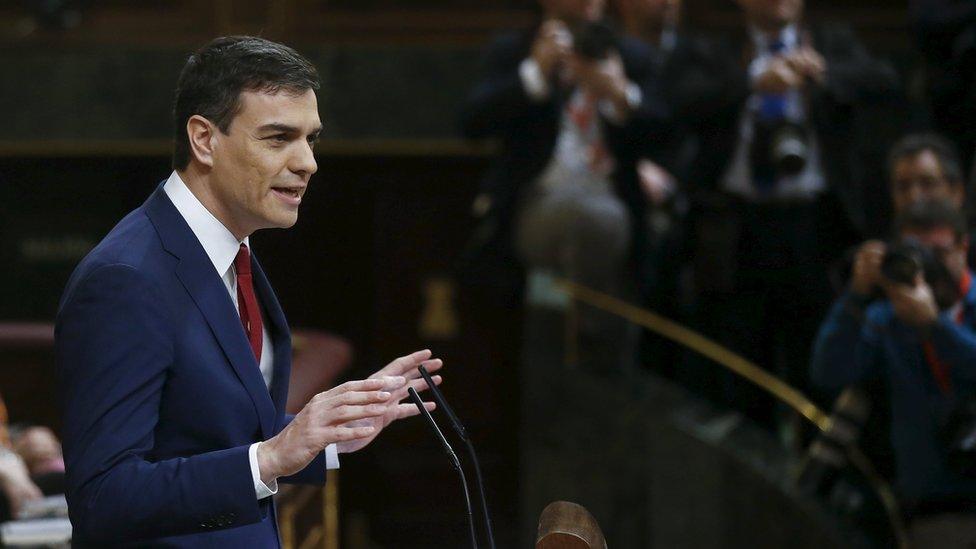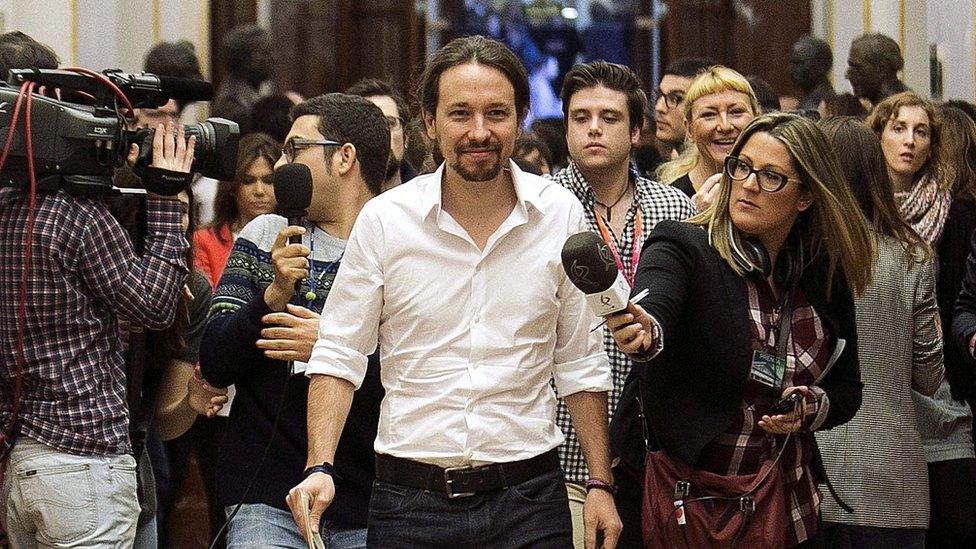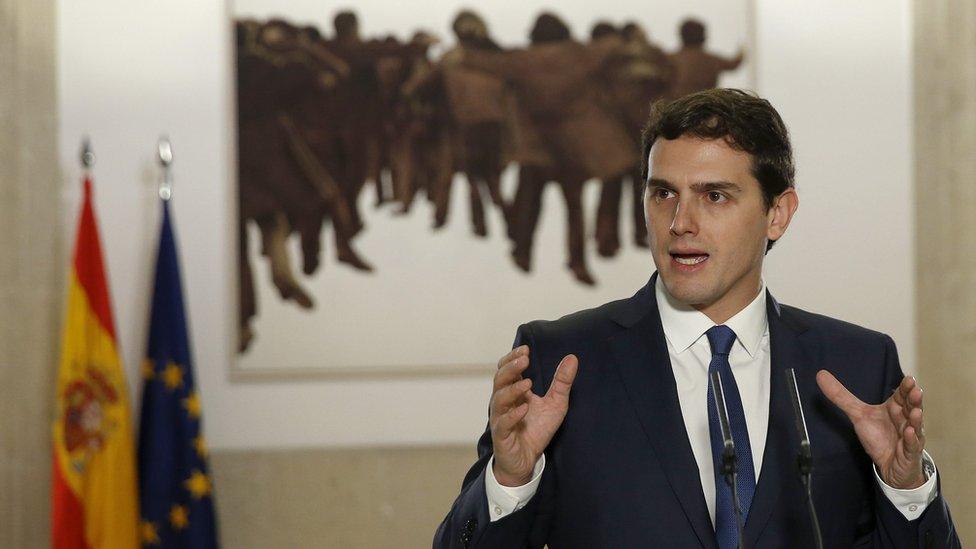Spain elections: Blame game starts over deadlock
- Published

Pedro Sanchez has until the end of the week to see if he can secure a majority in parliament
Spanish Socialist leader Pedro Sanchez on Tuesday evening pleaded with potential allies in parliament to support him as prime minister and prevent new elections in June, after December's ballot threw up an unprecedentedly fragmented political scene.
But as with much that has taken place over the past two and a half months, Mr Sanchez's plea is essentially mere choreography as he has only managed to do a deal with the centrist Ciudadanos party, while alienating the anti-austerity, left-wing Podemos.
The Socialist Party (PSOE) came second to the conservative Popular Party (PP) in December's inconclusive elections.
Alone, neither of the two new parties in parliament can give the PSOE an absolute majority, although Podemos offered a glimmer of hope of cobbling together a workable minority government with smaller left-wing groups and the acquiescence of Basque and Catalan nationalists.
There is no hope that Mr Sanchez will be assisted by the PP, which still has the rudder of the country in its possession until a new government can be formed.
Acting Prime Minister Mariano Rajoy points to the fact that he won December's elections and it is Mr Sanchez who is refusing to negotiate a triple alliance of the PP, the PSOE and Ciudadanos that would keep the conservative leader in power.


Partido Popular (Popular Party, PP): Centre-right party of Acting Prime Minister Mariano Rajoy, in power since December 2011 but lost its majority in 2015
Spanish Socialist Workers' Party (PSOE): Centre-left party, led by Pedro Sanchez, in power alternately with PP since 1982
Podemos: Left-wing party founded in 2014 by university professor Pablo Iglesias
Ciudadanos (Citizens): Centrist party formed in Catalonia in 2006 opposing Catalan independence before going national in 2013, led by Albert Rivera

'Change'
Mr Sanchez's speech felt like the start of what could be a long electoral campaign, until the possible ballot date of 26 June comes around.
The Socialist reeled off the potential benefits of "change" - the key word in his speech - according to the manifesto for government signed by the PSOE and Ciudadanos, including:
emergency social assistance for the worst-off
a federal state
anti-corruption measures
an end to Spain's late-hours working culture
"All of these things can be set in motion next week," Mr Sanchez repeated on several occasions, looking at Podemos leader Pablo Iglesias. "The parties of change" must come together, he added.

Pablo Iglesias has said he is not afraid of further elections in June
The message was the Socialists have understood the urgent need for reform in a country wracked by 21% unemployment and a political system plagued by corruption and they have been prepared to negotiate a better deal with political adversaries.
According to Mr Sanchez, the inflexibility of Podemos, which broke off talks with the PSOE when its accord with Ciudadanos was announced last week, means the legislature may last only until the deadline of 3 May.
"Real dialogue means taking the risk of being convinced," Mr Sanchez said, ending his address by saying that, win or lose, he was proud to have tried to unblock the political impasse.
Beautiful but useless?

Ciudadanos leader Albert Rivera urged other parties to come on board when he agreed a pact with the Socialists last week
Sitting in Spain's Congress, under a painting called The Embrace, last Wednesday, Mr Sanchez and Ciudadanos leader Albert Rivera explained the basis of an agreement some commentators described as beautiful but useless.
Both sides have ceded ground:
The PSOE has accepted a nuanced labour proposal allowing employers to hire and fire with some freedom, when the party had talked about repealing the Rajoy government's pro-business changes
Ciudadanos risks a little of its pro-business credibility by signing up to higher corporate taxation and the constitutional enshrinement of the right to social services
While its 200 proposals are often short on specifics, the "embrace agreement" is clearly an attempt to occupy a large swathe of the political spectrum, from the centre to the centre-left.
This leaves Podemos exposed as a stubbornly radical group not prepared to ease up on its demands for a massive tax-and-spend campaign to tackle poverty and a referendum on independence in Catalonia.
Mr Sanchez, who faces a possible leadership challenge in party primaries this spring, has chosen to embrace a party of moderation rather than succumb to a bear hug from the pony-tailed Mr Iglesias, who brought Podemos to within a whisker of overtaking the PSOE in December and has said he does not fear fresh elections.
As no-one finds the solution to Spain's fragmentation, the blame game has begun in earnest.